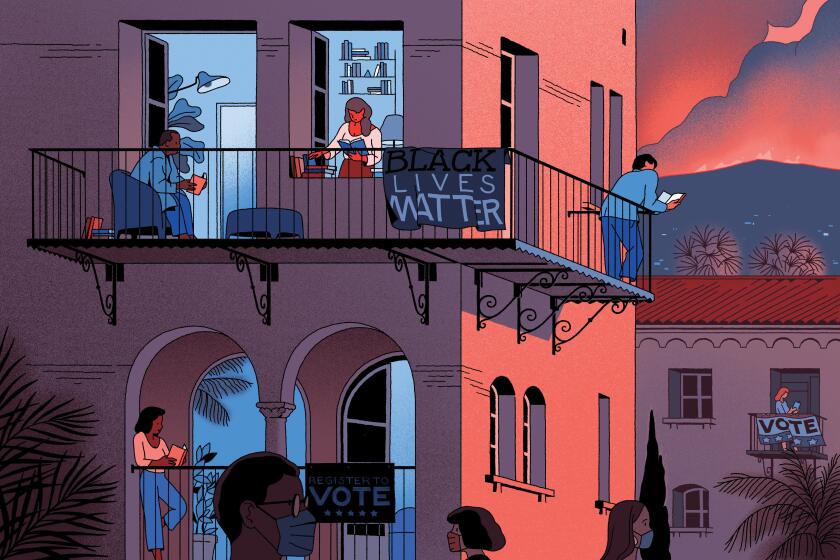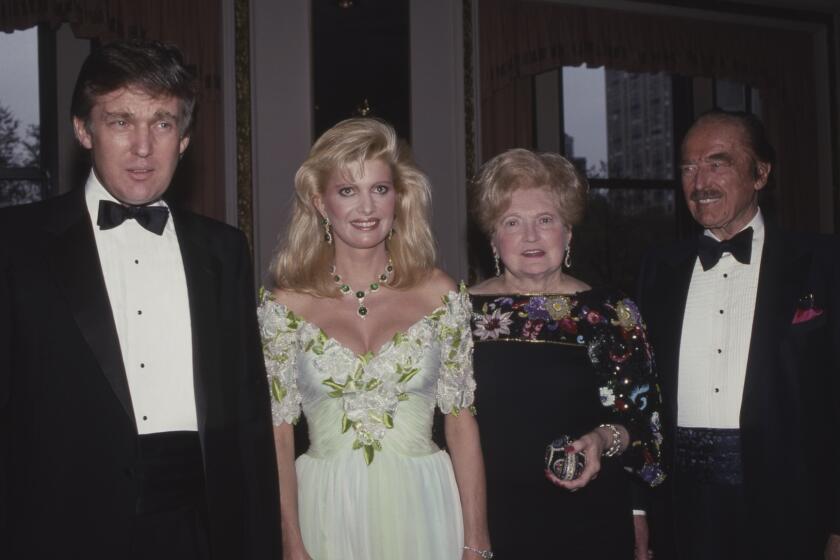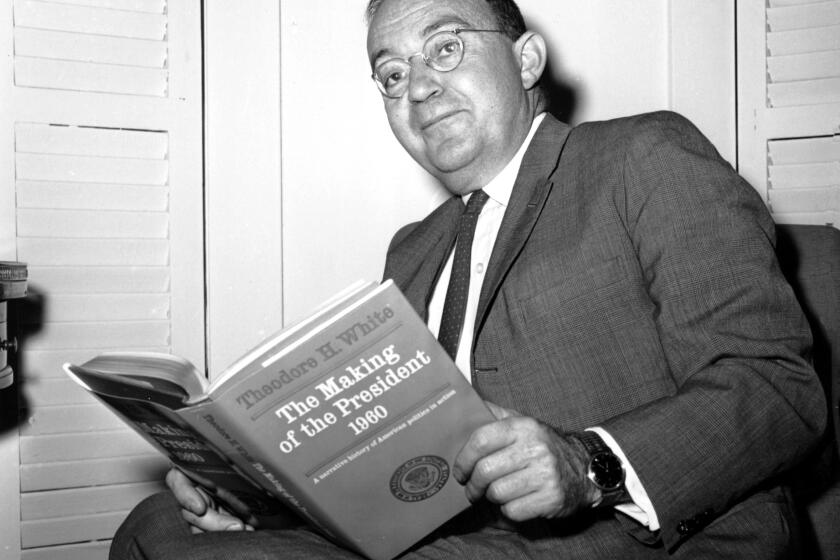The meta Trump book you didn’t know you needed (and wanted) to read
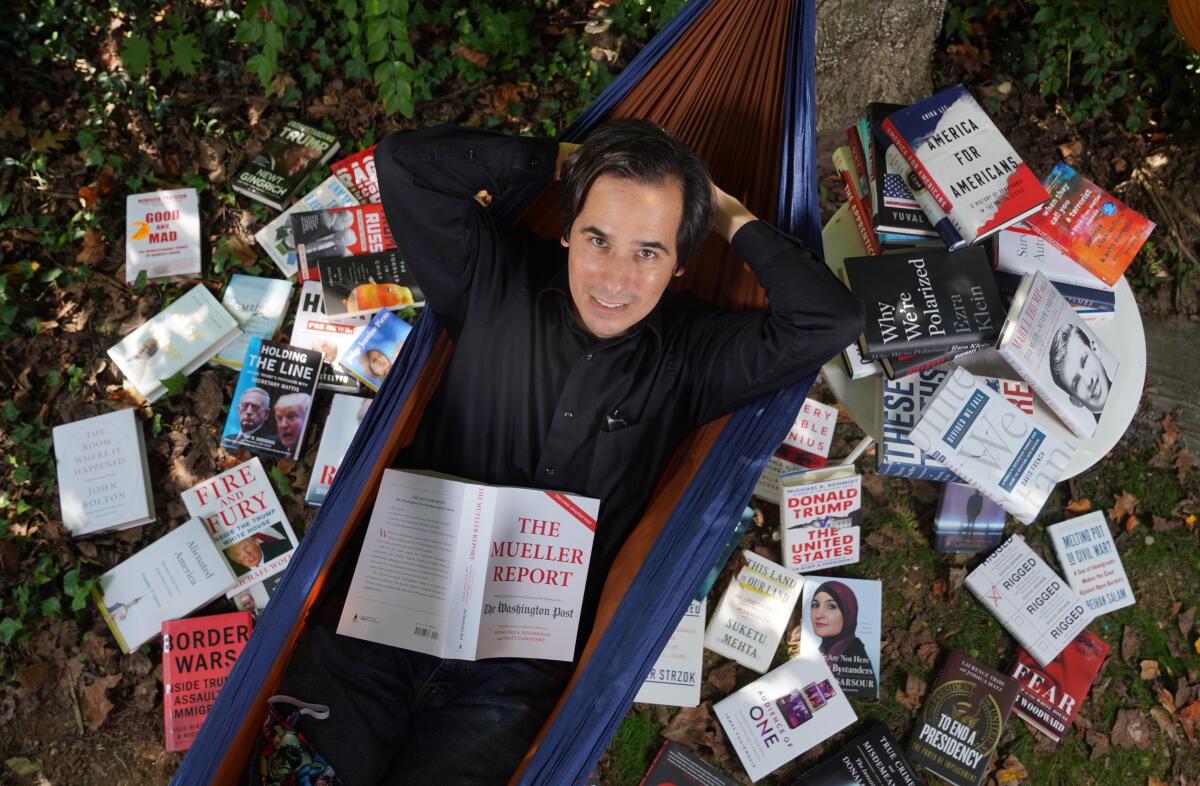
- Share via
On the Shelf
What Were We Thinking: A Brief Intellectual History of the Trump Era
By Carlos Lozada
Simon & Schuster: 272 pages, $28
If you buy books linked on our site, The Times may earn a commission from Bookshop.org, whose fees support independent bookstores.
Don’t be alarmed by Carlos Lozada’s book “What Were We Thinking: A Brief Intellectual History of the Trump Era.” Yes, it’s a compendium of 150 books on a man we already know too much about — the lucrative cottage industry of an ongoing political crisis. But they’re not all from ex-staffers with tales of White House chaos. Instead, Lozada is trying to get at something bigger — how we got here and what it means.
There are chapters not on specific books but on facets of this history in the making: the white working class and the #MeToo movement, immigration and Russian interference, the changing face of the Republican Party and the new resistance on the Left.
“I imagine that for some people, my book will serve as a ‘He read it so I don’t have to’ rundown of these books,” said Lozada, the Pulitzer Prize-winning nonfiction book critic of the Washington Post, from his home outside Washington, D.C. “Maybe you’ll pick up one or two as a result. That’s great.” But, he adds, “I do hope that there is also a sense of an underlying critique of this moment in American intellectual life.” There is. Lozada’s book is in conversation with the best books he touches on, by authors like Jill Lepore and Timothy Snyder, drawing out an American narrative that encompasses all its complexity and unmet promise.
This conversation has been edited.
Perhaps no other medium has better helped us process 2020. Our fall books special brings you the books and authors who’ve helped make sense of it.
How did you keep a clear handle on all the books that went into this one?
I use three-ring binders. I’m so retro. [He holds up an overstuffed binder.] It flows from how I review books. The chaos-in-the-White-House books, they really start to blend together. Like, did I read that in “A Very Stable Genius” or was that in the Mueller Report? Is that in Michael Schmidt’s new book [“Donald Trump V. the United States”] or in Jim Comey’s memoir? There’s a lot of overlap and redundancy.
But the great thing is that they also start getting into conversations with each other. When I see Jeffrey Toobin writing about the Mueller investigation, and then see this latest book by Andrew Weissmann [“Where Law Ends: Inside the Mueller investigation”] or the FBI agent Peter Strzok‘s book [“Compromised: Counterintelligence and the Threat of Donald J. Trump”], I start seeing how new forms of conventional wisdom coalesce. For two years, there was a chunk of this country for whom Mueller was this hero, the righteous investigator whose sense of integrity is going to rescue America. When it didn’t work out that way, we started seeing the seeds of the Mueller-blew-it backlash which is now in full bloom. Those moments of overlap help me anticipate where conversations are headed.
At one point, you weave together a number of different accounts of a single important meeting, which Michael Wolff’s “Fire and Fury” missed.
There was this meeting at the Pentagon early in the Trump presidency where a lot of the top national security officials were basically staging an intervention with Trump, trying to get him to see the importance of NATO, of international alliances, of having American troops deployed around the world. “The meeting in the tank” is covered exhaustively in multiple books, in Bob Woodward’s ”Fear” and others. I think it speaks to the power of Steve Bannon, who became the premiere narrator of the early Trump years in a way that far exceeded his own permanence in the White House. Once you put them together — I mean, not a lot of people are going to read five different books that talk about this meeting, that’s what I get to do — you have what feels like a running transcript.
That’s also what this book is doing in the larger sense, finding a running story of this cultural moment.
I wanted to write a book that was exploring how we as a country grappled with the Trump phenomenon. How we thought about it in real time. I feel I’ve gained a certain suspicion of the easy prefabricated narratives. For example, the white working class books: I found that two different books profiled the same Trump voter in Pennsylvania and gave him entirely different motivations. In one book, he’s this economic populist; he thinks the Democrats have forgotten the working class. In the other book, he’s a 9/11 truther, he rails against transgender bathrooms — he’s a total culture warrior. He’s the same guy! But what the authors saw in him dovetailed with their larger views of why Trump won the presidency.
As a critic of nonfiction, how do you have a sense of when something rings true or not?
When everything fits together too perfectly, I wonder what’s been left out. Truly honest books have to accept messiness.
The President’s “only niece,” clinical psychologist Mary Trump, portrays a man warped by his family in “Too Much and Never Enough.”
One book you didn’t include is Mary Trump’s “Too Much and Never Enough,” which came out less than three months ago.
Unfortunately, it was already past my deadline, but I did review it for the Post. I was really impressed with that book. Certainly because of her proximity to the family; she’s Trump’s niece. And because she has this academic training in clinical psychology, it’s an absolutely unique vantage point. Mary Trump brings the experience of seeing him up close and growing up in this family that, to me, made it unique among all these Trump tell-alls. It was also well-written; I mean she’s funny, she tells a really good story.
There are various books that look at him through one analytic lens. In Jim Comey’s memoir Trump is almost this mobster figure. The New York Times television critic James Poniewozik wrote a book about Trump as the creation of television. Daniel Drezner wrote about Trump as toddler. This set of books takes one prism through which to understand him. They’re gimmicky, but they’re also insightful in their own way. Mary Trump is able to give you a very direct look.
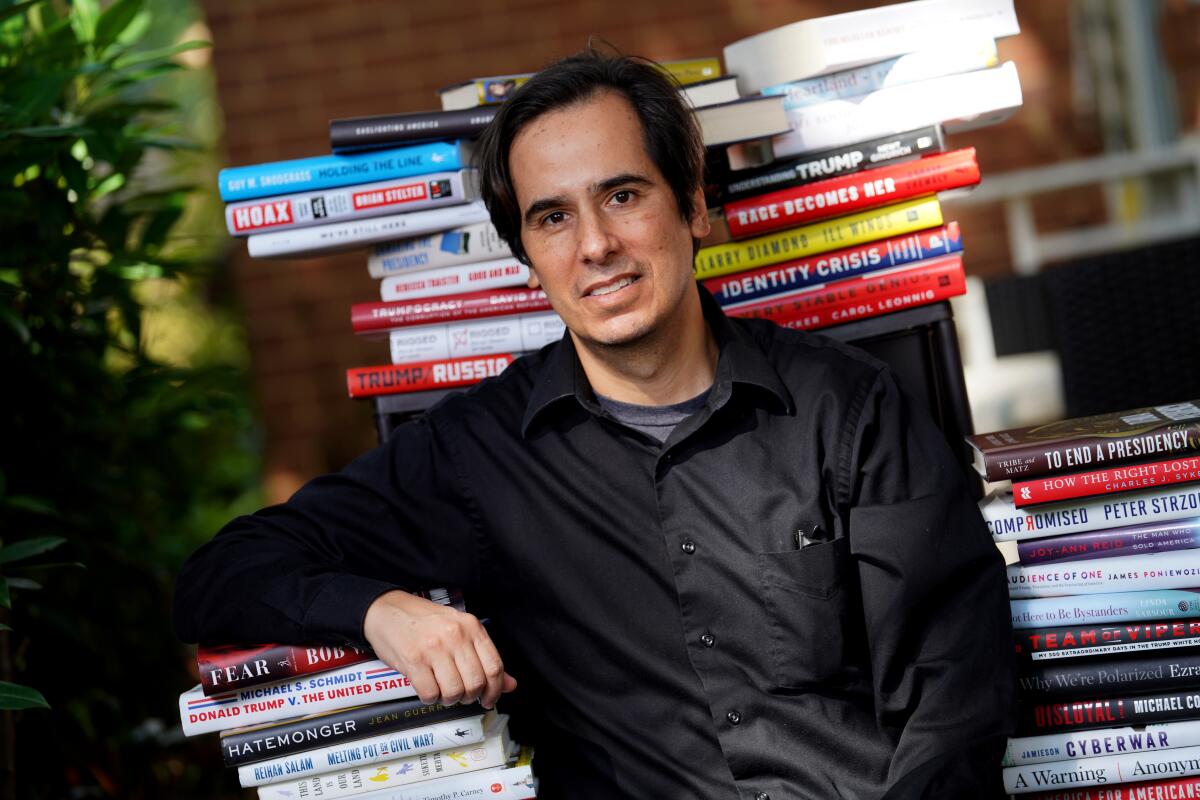
While you were working on this book, did you have a dark night of the soul? Was there a moment where you were, like, I just can’t crack another one of these?
I had that feeling very recently. Of course, it could be because of the pandemic; it could be because of the country’s racial reckoning. There’s a lot going on right now. But I had that feeling when I read “Disloyal” by Michael Cohen. It is a greatest hits compilation of all your worst fears about Donald Trump — his instincts, impulses, beliefs, how he makes decisions. This from someone that was with him for so long, during the height of “The Apprentice” and Birtherism and the campaign. That was a moment I just wanted to just say, OK, uncle, I can’t keep reading. Of course I channeled that into my review.
But then there are these other books that tell me that this isn’t all there is. Some of the most useful have been those that show how so many of the fights that we’re having right now are fights that are constant, that are ongoing, that have been here since the very beginning. Like Carol Anderson’s “One Person, No Vote,” that looks at the centuries-long battle over voting rights and voter suppression. Like Jill Lepore’s “These Truths,” that looks at those self-evident truths of the Declaration of Independence and sees how our constant effort and failure to fully live up to them is what this place is all about. For me, the most useful books of the Trump era are not about Trump at all. They show us how these battles are not an oddity in America; they are the definition of America.
David Shribman on the sorry state of political books.
Do you feel like you’ve got the whole picture, the whole Trump-era narrative?
I feel like I have a snapshot of a moment, and for me that’s enough. If Trump loses in November, there will be authoritative stories explaining why that was the inevitable path of what happened — and authoritative books. And if he wins, there will be just-as-authoritative books — by those same authors! — that will explain why it was all headed in that direction.
Kellogg is formerly books editor of the Los Angeles Times.
More to Read
Sign up for our Book Club newsletter
Get the latest news, events and more from the Los Angeles Times Book Club, and help us get L.A. reading and talking.
You may occasionally receive promotional content from the Los Angeles Times.
